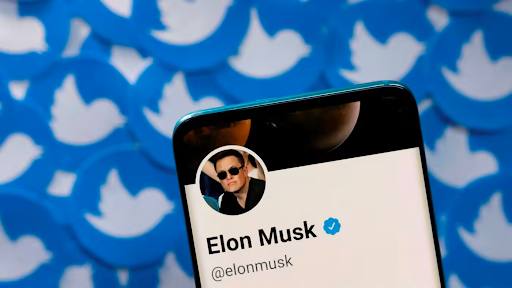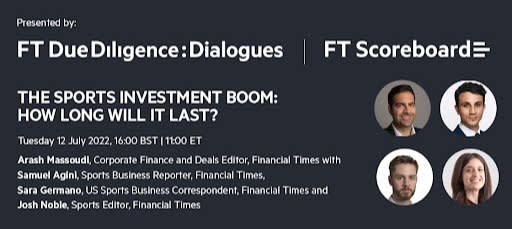One thing to start: US antitrust authorities are investigating the PGA Tour over the elite US golf circuit’s response to the emergence of LIV Golf, a new rival bankrolled by Saudi Arabia’s sovereign wealth fund. More here.
Don’t miss today: DD’s Arash Massoudi is teaming up with FT colleagues for a virtual event to discuss the recent explosion in dealmaking in the business of sport. Register for free to watch live or on-demand here.
In today’s newsletter:
-
Elon Musk and Twitter roll up their sleeves
-
An oligarch bet struggles to sell for £1
-
The Chinese automaker supplanting Tesla
Elon Musk will go to a Delaware courtroom (again) before Mars
On Monday, Elon Musk had some advice for his more than 100mn Twitter followers on getting better sleep.
If we had to take a guess on what is keeping Musk awake at night, we’d probably have to say it’s the looming lawsuit from his favourite social media platform.
To recap: Musk said he would buy Twitter for $44bn in April. Since then, he’s been having second thoughts about his plan to take over the company he likened to the digital world’s “public town square”.
On Friday evening, just three months after a deal was struck, Musk tried to back out, citing a number of breaches by Twitter. Even though he had been laying the groundwork to walk away for weeks, it still managed to send the internet into a tailspin.

The merger contract will now take centre stage in what is expected to be a seminal case for M&A as Twitter seeks to force Musk to honour the terms of the deal. The San Francisco-based company has hired elite law firm Wachtell, Lipton, Rosen & Katz, which will square off against Quinn Emanuel Urquhart & Sullivan, the firm Musk has hired.
On Monday, Wachtell fired back at Musk, saying in a letter his termination is “invalid” and he “knowingly, intentionally, wilfully, and materially” breached the merger agreement.
Twitter reckons it stands a pretty good chance of beating Musk in Delaware court, where the company is incorporated, and so do a lot of the corporate law experts we’ve spoken to. But this is Musk we’re talking about — he isn’t exactly known for backing down in a fight.
Musk came out swinging. He posted two memes on Twitter: one showing a picture of actor Chuck Norris playing chess with the caption “Chuckmate” and another referencing his claim that Twitter didn’t provide the information he had requested on bots and is now trying to force him to buy the company.
No matter who wins in court — if it does indeed get there — everyone is a loser, including those of us who aren’t involved and have to keep covering Musk’s shenanigans.
Twitter’s share price is down significantly, morale is at an all-time low and the legal battle will take time and resources. Its best-case scenario might be that it avoids court altogether and manages to extract more money from the billionaire than the already agreed $1bn break fee.
For Musk, this is all a side show from his day job running Tesla and SpaceX, which he hopes will help colonise Mars. The damage is more intangible in that this probably won’t be good for his reputation — we say “probably” because he isn’t exactly known for facing repercussions. But it’s difficult to see who will be willing to take him at his word now.
Then again, he’s the world’s richest man. And he’s proven that the rules of the game just don’t apply to anyone with that title.
A £1 deal that has the UK gov asking questions
For a few months now, the owners of a small lossmaking UK telecoms group called Truphone have been trying to flog the company.
Why? Because one of its owners is Roman Abramovich. Ever since the Russian oligarch was sanctioned by the UK and the EU, Truphone has been struggling to raise funds. And its customers have been getting nervous.
In May, Truphone managed to find willing buyers: Hakan Koç, a German businessman who founded the SoftBank-backed used-car dealers company Auto1, and his business associate Pyrros Koussios. The two men offered to pay the princely sum of £1 for the telecoms company.

Truphone makes embedded SIM cards that allow users to avoid roaming charges. It was valued at £410mn in 2020 and has received more than £300mn in investment from Abramovich and his two Russian business partners, Alexander Abramov and Alexander Frolov. It has recorded 15 consecutive years of losses, including £16mn in 2020.
Koç, despite the troubles Auto1 is facing, seems intent on buying this company. (Auto1 shares are down 80 per cent over the past 12 months.) But has run into a roadblock.
On Thursday, just a day before Koç and Koussios were hoping to close the deal, it was “called in” under the new National Security and Investment Act.
Under the act, the government has the power to block or unwind transactions it believes may pose a risk to Britain’s national security. Calling in the transaction would not, in itself, be enough to block the sale, but the government also issued an interim order to halt the deal while it investigates.
The hopeful buyers, who believe the government’s decision is linked to a contract Truphone has with British telecoms group BT, are frustrated. They are challenging the decision, not least because they themselves were the ones who notified the business secretary about the transaction.
DD has been wondering whether there are any links between Koç and Truphone’s owners that may be complicating matters.
Auto1 previously received funding from Target Global, a venture capital firm formerly run by Frolov’s son. Koç says that neither he nor Koussios have a direct relationship with any of Truphone’s current owners and have never met them.
Berkshire Hathaway finds its Elon Musk in China
For a man with $25bn to his name, Wang Chuanfu is remarkably little known in the west.
Twenty years ago, the bespectacled Chinese chemistry professor turned tech entrepreneur unveiled plans for his BYD group to buy a failing state car manufacturer that had a sideline in producing missiles to bomb Taiwan.
His plan: to rip out petrol-guzzling internal combustion engines and replace them with batteries.
The move “seemed loaded with nutty ambition”, testing the faith of BYD’s shareholders who thought they were invested in a successful mobile phone battery producer, analysts later said.

Before the decade was up, Wang pulled off a stunning coup. BYD scored an investment of nearly a quarter of a billion dollars from the most ruthless of disbelievers: Warren Buffett.
Charlie Munger, the sage of Omaha’s right-hand man, told his boss that in Wang they had found a mix of Jack Welch, the legendary General Electric boss, and Thomas Edison.
Last week, Wang’s vision, and Buffett’s bet, was validated when BYD snatched Tesla’s crown as the king of plug-in car sales.
In dethroning Musk, Wang also achieved what General Motors, Ford and Volkswagen have all failed to do, despite their more than three centuries of experience making cars.
BYD’s coronation as the king of electric vehicles has rankled some commentators who point out that the Tesla comparison is not like-for-like.
Many of BYD’s models are plug-in hybrid vehicles, which use a large battery in addition to a traditional engine for longer journeys, but are counted as “zero emission” vehicles under China’s sales rules.
Few argue, however, that BYD or Wang can be ignored any longer.
Not only are BYD’s EV sales up 300 per cent, the company produces some of the lowest-cost EV batteries in China, and has an auto chip business to boot. Having conquered a chunk of the nascent EV market in China, aggressive offshore expansion beckons.
Job moves
-
Morgan Stanley has promoted Eli Gross and Simon Smith to co-heads of its investment banking division. They replace Mark Eichorn and Susie Huang, who will become executive chairs.
-
Deutsche Bank has promoted Gil Wilson to head of consumer and retail for the Emea region. Wilson has been at the bank since 2011.
-
Skadden has hired Maria Cruz Melendez as a partner in its government enforcement and white collar crime group. She rejoins the firm from the US attorney’s office.
Smart reads
Nickel’s ‘Big Shot’ While Xiang Guangda moves on from the nickel market fiasco relatively unscathed, others are still dealing with the repercussions of his massive wager, which almost broke the market, Bloomberg reports.
Uber suspicious A trove of files leaked to the Guardian tells the inside story of how Uber secretly lobbied governments, flouted laws and thwarted law enforcement.
Phishing season A US defence contractor that bid to buy NSO, the Israeli company known for its infamous Pegasus spyware, said American spies backed its efforts even though the business had been blacklisted by the Biden administration, according to this New York Times report.
News round-up
Klarna: buy now, pay 85% less a year later (Alphaville + Press Release)
Wirecard forged client details to secure €900mn investment from SoftBank (FT)
Sequoia’s vaunted strategy feels the pain of tech selloff (Bloomberg)
Dufry agrees to buy Autogrill to form world’s largest travel stores group (FT)
Private equity: capital call financing speeds up deals (Lex)
China tech stocks: M&A goes on the chopping block (Lex)
India’s top court sentences tycoon Vijay Mallya to four-month jail term (FT)











